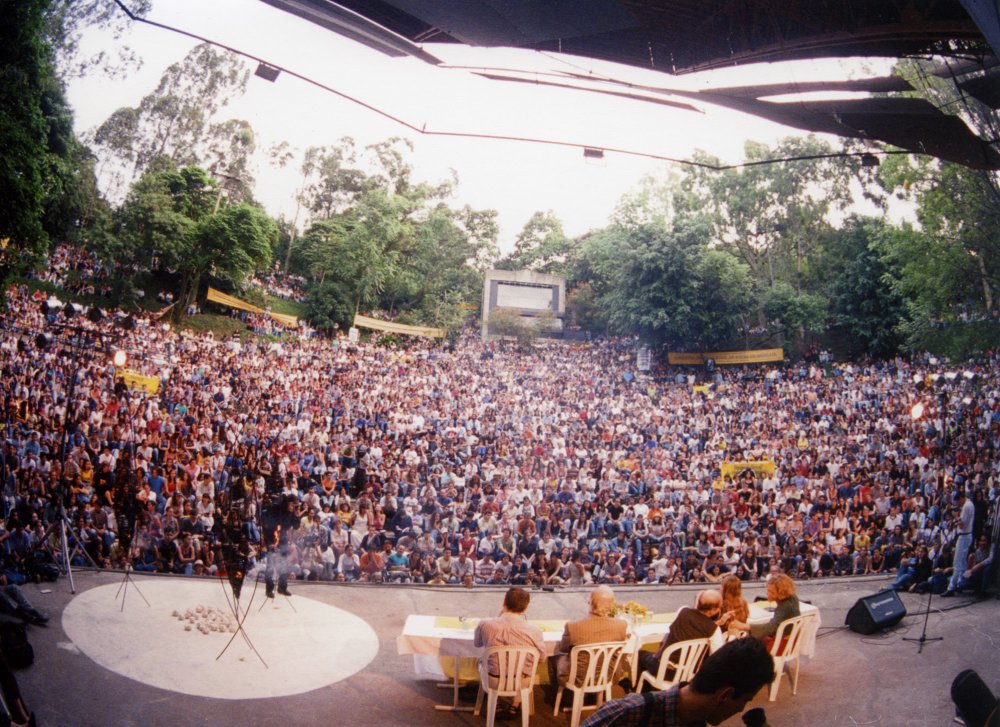10º International Poetry Festival of Medellín

76 poets from 46 countries and several indigenous nations take part in the X International Poetry Festival of Medellín, which is held between June 23 and July 2 of 2000, with the carrying out of 88 poetry readings in Medellín and other Colombian cities: Bogotá, Cartagena, Barranquilla, Santa Marta, Tunja, Ibagué, Pereira, Armenia, Bucaramanga, Quibdó, Barrancabermeja, Villavicencio and Leticia.
International institutions such as the Dutch cultural foundations Hivos, Prins Claus Fonds and Novib, the German foundation Heinrich Böll, the Swiss Federal Department of Foreign Affaire and the UNESCO, give financial support to the X Festival. In Colombia the event is sponsored by the Municipality of Medellín (which reduced 60% $ 155 million Colombian pesos) the budget that according to the agreements 35 of 1993 and 40 of 1997 was supposed to give the event), the Ministry of Culture and the diplomatic corps accredited in Colombia.
The poets who participated were: Víctor Redondo (Argentina), Leroy Green (Belize), Pedro Shimose (Bolivia), Haroldo de Campos (Brazil), Thiago de Mello (Brazil), Jean-Marc Desgent (Canada), the natives Renata Durán, Jorge Bustamante García, Jorge Torres, Liana Mejía, Miguel Angel López -Vito Apshana-; Armando Orozco, Julián Malatesta, Antonio Zibara, Federico Diaz Granados, Celedonio Orjuela, Eduardo Peláez, Carlos Bedoya, Robinson Quintero, Miryam Montoya, Darío Ruiz, Eduardo Escobar, Enrique Buenaventura, Andrea Cote, and Giovanni Quessep (Colombia), Kama Kamanda (Congo), Drazen Katunaric (Croatia), Camila Schumacher (Costa Rica), César López (Cuba), Reynaldo García Blanco (Cuba), Gonzalo Rojas (Chile), Annemette Kure Andersen and Lenne Henningsen (Denmark), Fernando Cazón Vera (Ecuador), Nasar Abdallah Nasar (Egypt), Mario Noel Rodríguez (El Salvador), Aida Párraga (El Salvador), John Hegley (England), Eira Stenberg (Finland), Tobías Burghardt (Germany), Ana María Rodas (Guatemala), Frankétienne (Haiti), Kofi Awoonor (Ghana), Kedarnath Singh (India), Kailash Vajpayee (India), Naim Araidi (Israel), Franca Bacchiega (Italy), Giuseppe Conte (Italy), Homero Aridjis (Mexico), Galsan Tschinag (Mongolia), Hassan Elouazzani (Morocco), Alan Brunton (New Zealand), Odia Ofeimun (Nigeria), Héctor Collado (Panama), Washington Delgado (Peru), RayVi Sunico (Philippines), Carolina Ilica (Romania), Adonis (Siria-Lebanon), Anne Rananzinghe (Sri Lanka), Ana Rossetti (Spain), Bengt Emil Johnson, Kerstin Stáhl, Lasse Söderberg (Sweden), Christian Uetz (Switzerland), Euphrase Kezilahabi (Tanzania), Tugrul Tanyol (Turkey), Saúl Ibargoyen (Uruguay), Francisco Pérez Perdomo (Venezuela), María Antonieta Florez (Venezuela), and Musaemura Zimunya (Zimbabwe).
For the first time in the history of the Festival a great diversity of indigenous poetic expressions (ceremonial songs, mythic accounts of the creation of the world and poems) is included. The Amerindians who participated were: Miguelangel López-Vitorio Vitorio Apushana) a Wayuu national, who in 2000 was awarded the prize Casa de las Américas; the Huitoto nationals Rodolfo Giagrecudo, Antonio Dimas, Manuel Safiama, Prudencia Farecade and Pablo Piarecudo; Leonel Lienlaf (Mapuche nation, Chile); Ariruma Kowii (Kichwa nation, Ecuador); Simón Ortiz (Acoma nation, United States); and José Ángel Fernández (Wayuu nation, Venezuela).
